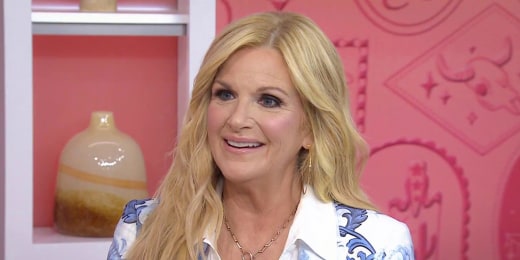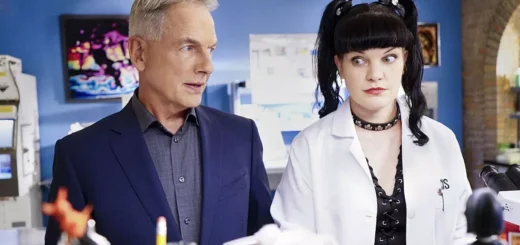Tyrant or Truth-Teller? On live TV, Trisha Yearwood, Garth Brooks’ wife, delivered a powerful rebuke to Karoline Leavitt on racism and inequality, leaving her speechless. Leavitt’s attempt to defend her stance was met with Yearwood’s sharp, profound words, stunning the audience and sparking a social media firestorm. Daytime TV’s unpredictable nature fueled this electrifying clash between the rising political figure and the respected country star. What started as a simple exchange of views escalated into a piercing, unforgettable confrontation. The tense moment captivated viewers, leaving them in awe and fueling endless debates online.
Daytime television has always thrived on spirited debate, surprise moments, and the occasional clash of personalities. Yet even seasoned viewers could not have predicted the intensity of a recent exchange between rising political figure Karoline Leavitt and country music legend Trisha Yearwood. What began as a measured discussion quickly escalated into one of the most striking live television moments in recent memory, a confrontation that silenced the audience and ignited a storm of conversation across social media platforms.

The segment began harmlessly enough, with Leavitt welcomed onto a panel designed to tackle questions of fairness, inequality, and cultural division. At first, the conversation unfolded as viewers expected: polite comments, carefully worded positions, and standard political talking points. But the tone shifted dramatically when Leavitt held firm on her controversial stance. With her trademark composure, Trisha Yearwood leaned forward, her expression signaling that she was about to step into the fray. What followed changed the mood of the studio in an instant.
“You can defend that line all you want,” Yearwood said firmly, her voice calm but commanding, “but history shows us that ignoring people’s struggles does not make them disappear.” The weight of her words was unmistakable. The studio audience froze, caught between shock and anticipation. The energy in the room shifted from casual chatter to tense stillness, as if the set itself had become a courtroom where a verdict was about to be delivered.
Leavitt attempted to respond, but her rebuttal faltered. Yearwood pressed on, layering her points with quiet force and a conviction that pierced through Leavitt’s practiced defenses. Her arguments, delivered with precision and passion, gradually stripped away Leavitt’s confidence. What viewers saw was a rare moment in live broadcasting: a seasoned political figure left visibly unsettled, unable to summon the words to defend her position.
For the audience, accustomed to laughter, applause, and quick banter, the silence was almost unnerving. No one reacted. No clapping, no interruptions—just hushed attention as every person in the room seemed to hold their breath. The silence after Yearwood’s remarks carried a power of its own, magnifying the effect of her words and leaving Leavitt struggling to recover.

The impact of the moment stemmed not only from what was said but also from who said it. Leavitt, still establishing her place in the political landscape, is known for her unwavering positions and combative style. Yearwood, by contrast, is celebrated not only for her decades-long career in music but also for her reputation as a grounded, thoughtful figure in American culture. The juxtaposition of these two personalities—one steeped in politics, the other in artistry—highlighted the clash as something more than just an argument. It was, in essence, a symbolic confrontation between ideology and empathy, rhetoric and lived experience.
The host eventually tried to move the discussion forward, but the atmosphere had shifted irrevocably. Panelists who spoke afterward seemed subdued, as though wary of disrupting the gravity of what had just occurred. Even the audience, usually eager to respond with applause or laughter, remained restrained, whispering quietly among themselves instead of reacting outwardly. The tension lingered like smoke after a fire, hanging heavy over every subsequent exchange.
Beyond the studio walls, the moment quickly spread. Clips circulated online within hours, sparking passionate debates across forums and social platforms. Supporters of Leavitt rushed to defend her, while others praised Yearwood’s willingness to speak uncomfortable truths in a public forum. Some described the exchange as historic, while others viewed it as painful yet necessary. Regardless of perspective, nearly everyone agreed it was a moment that would not be forgotten.
Part of the resonance lay in the authenticity of the exchange. Unlike scripted television or heavily edited reality programming, live broadcasts leave no room for revision. Yearwood’s words and Leavitt’s visible discomfort were unfiltered and immediate. This unscripted nature gave the clash a raw edge, highlighting the unpredictable power of live television to reveal vulnerability and conviction in equal measure.

For Leavitt, the encounter may serve as a cautionary tale. Television is not simply a stage for rehearsed talking points; it is a medium where genuine conviction and authenticity can override practiced rhetoric in a heartbeat. Her inability to counter Yearwood’s remarks showed how even the most confident political figures can be disarmed when faced with sincerity backed by moral weight.
For Yearwood, the moment reinforced her influence beyond the music industry. Her calm yet firm dismantling of Leavitt’s position demonstrated how cultural figures, unbound by political agendas, can wield enormous power in national conversations. Her words reminded viewers that truth can come from many places, not just podiums or policy debates.
In the days that followed, the exchange continued to dominate public conversation. Analysts replayed the clip, cultural critics dissected the implications, and fans of both women defended their respective sides. Yet one undeniable reality emerged: Yearwood’s words landed with uncommon force, and the stunned look on Leavitt’s face captured the essence of what happens when conviction collides with authenticity.

This was more than a heated exchange; it was a defining television moment. It showcased the unpredictability of live broadcasting, the enduring influence of cultural voices, and the profound impact of speaking truth with clarity and compassion. For viewers, it was a reminder that even in the polished world of television, moments of raw honesty still have the power to stop us in our tracks. For Leavitt, it may be remembered as a humbling lesson. For Yearwood, it was a demonstration of the unique authority she carries. And for everyone who witnessed it, it was proof that words, delivered with conviction, can reverberate far beyond the studio walls.


